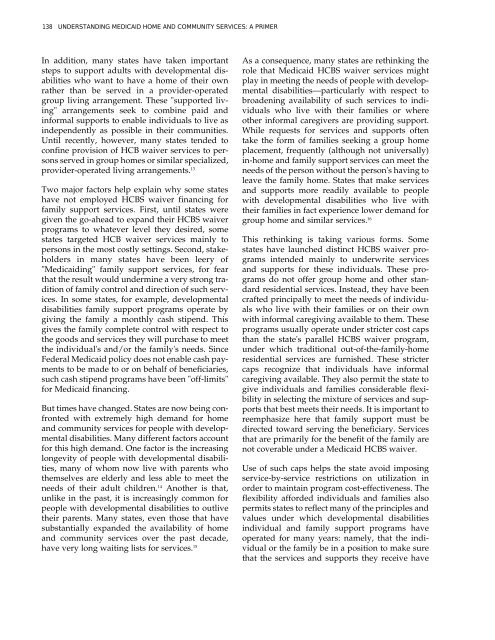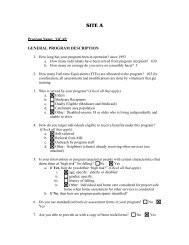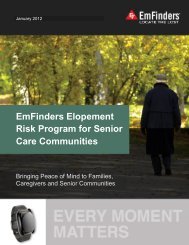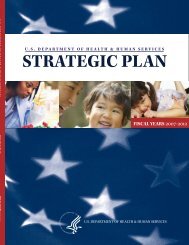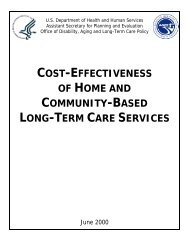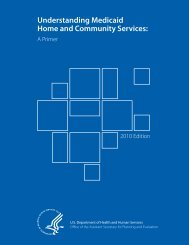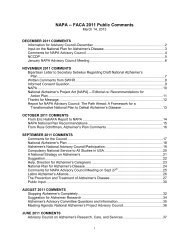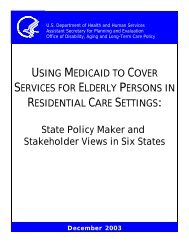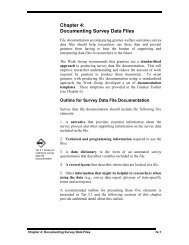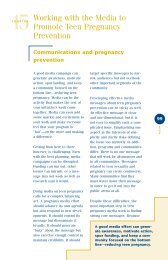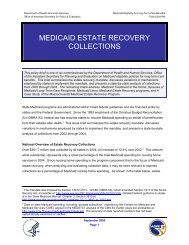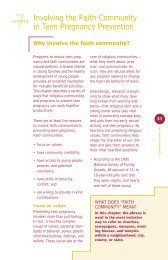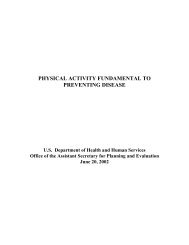Full PDF Version - ASPE - U.S. Department of Health and Human ...
Full PDF Version - ASPE - U.S. Department of Health and Human ...
Full PDF Version - ASPE - U.S. Department of Health and Human ...
- No tags were found...
You also want an ePaper? Increase the reach of your titles
YUMPU automatically turns print PDFs into web optimized ePapers that Google loves.
138 UNDERSTANDING MEDICAID HOME AND COMMUNITY SERVICES: A PRIMERIn addition, many states have taken importantsteps to support adults with developmental disabilitieswho want to have a home <strong>of</strong> their ownrather than be served in a provider-operatedgroup living arrangement. These "supported living"arrangements seek to combine paid <strong>and</strong>informal supports to enable individuals to live asindependently as possible in their communities.Until recently, however, many states tended toconfine provision <strong>of</strong> HCB waiver services to personsserved in group homes or similar specialized,provider-operated living arrangements. 13Two major factors help explain why some stateshave not employed HCBS waiver financing forfamily support services. First, until states weregiven the go-ahead to exp<strong>and</strong> their HCBS waiverprograms to whatever level they desired, somestates targeted HCB waiver services mainly topersons in the most costly settings. Second, stakeholdersin many states have been leery <strong>of</strong>"Medicaiding" family support services, for fearthat the result would undermine a very strong tradition<strong>of</strong> family control <strong>and</strong> direction <strong>of</strong> such services.In some states, for example, developmentaldisabilities family support programs operate bygiving the family a monthly cash stipend. Thisgives the family complete control with respect tothe goods <strong>and</strong> services they will purchase to meetthe individual's <strong>and</strong>/or the family's needs. SinceFederal Medicaid policy does not enable cash paymentsto be made to or on behalf <strong>of</strong> beneficiaries,such cash stipend programs have been "<strong>of</strong>f-limits"for Medicaid financing.But times have changed. States are now being confrontedwith extremely high dem<strong>and</strong> for home<strong>and</strong> community services for people with developmentaldisabilities. Many different factors accountfor this high dem<strong>and</strong>. One factor is the increasinglongevity <strong>of</strong> people with developmental disabilities,many <strong>of</strong> whom now live with parents whothemselves are elderly <strong>and</strong> less able to meet theneeds <strong>of</strong> their adult children. 14 Another is that,unlike in the past, it is increasingly common forpeople with developmental disabilities to outlivetheir parents. Many states, even those that havesubstantially exp<strong>and</strong>ed the availability <strong>of</strong> home<strong>and</strong> community services over the past decade,have very long waiting lists for services. 15As a consequence, many states are rethinking therole that Medicaid HCBS waiver services mightplay in meeting the needs <strong>of</strong> people with developmentaldisabilities—particularly with respect tobroadening availability <strong>of</strong> such services to individualswho live with their families or whereother informal caregivers are providing support.While requests for services <strong>and</strong> supports <strong>of</strong>tentake the form <strong>of</strong> families seeking a group homeplacement, frequently (although not universally)in-home <strong>and</strong> family support services can meet theneeds <strong>of</strong> the person without the person's having toleave the family home. States that make services<strong>and</strong> supports more readily available to peoplewith developmental disabilities who live withtheir families in fact experience lower dem<strong>and</strong> forgroup home <strong>and</strong> similar services. 16This rethinking is taking various forms. Somestates have launched distinct HCBS waiver programsintended mainly to underwrite services<strong>and</strong> supports for these individuals. These programsdo not <strong>of</strong>fer group home <strong>and</strong> other st<strong>and</strong>ardresidential services. Instead, they have beencrafted principally to meet the needs <strong>of</strong> individualswho live with their families or on their ownwith informal caregiving available to them. Theseprograms usually operate under stricter cost capsthan the state's parallel HCBS waiver program,under which traditional out-<strong>of</strong>-the-family-homeresidential services are furnished. These strictercaps recognize that individuals have informalcaregiving available. They also permit the state togive individuals <strong>and</strong> families considerable flexibilityin selecting the mixture <strong>of</strong> services <strong>and</strong> supportsthat best meets their needs. It is important toreemphasize here that family support must bedirected toward serving the beneficiary. Servicesthat are primarily for the benefit <strong>of</strong> the family arenot coverable under a Medicaid HCBS waiver.Use <strong>of</strong> such caps helps the state avoid imposingservice-by-service restrictions on utilization inorder to maintain program cost-effectiveness. Theflexibility afforded individuals <strong>and</strong> families alsopermits states to reflect many <strong>of</strong> the principles <strong>and</strong>values under which developmental disabilitiesindividual <strong>and</strong> family support programs haveoperated for many years: namely, that the individualor the family be in a position to make surethat the services <strong>and</strong> supports they receive have


